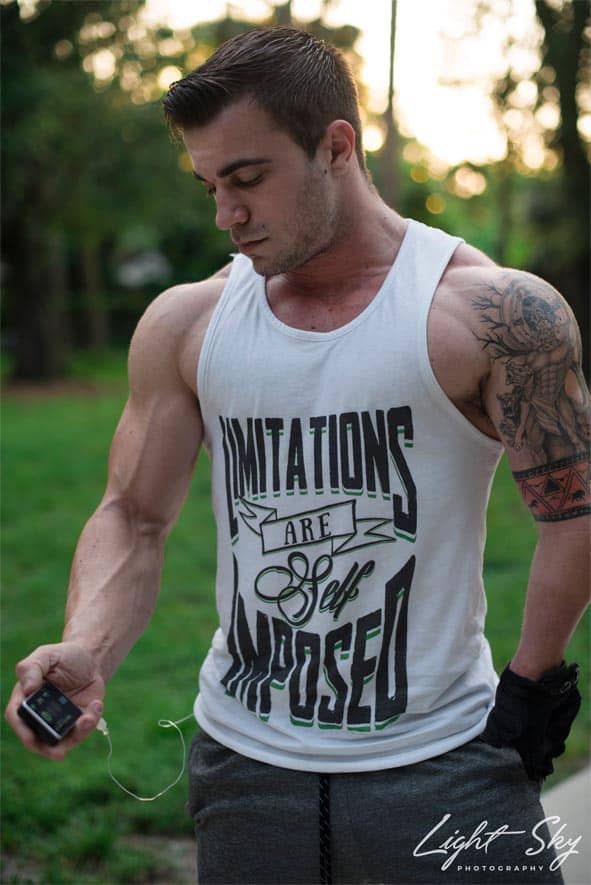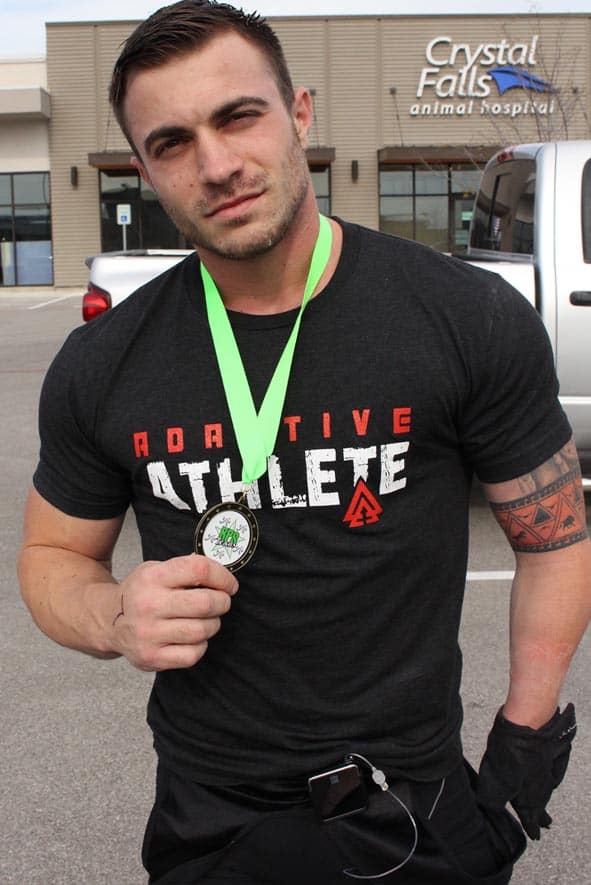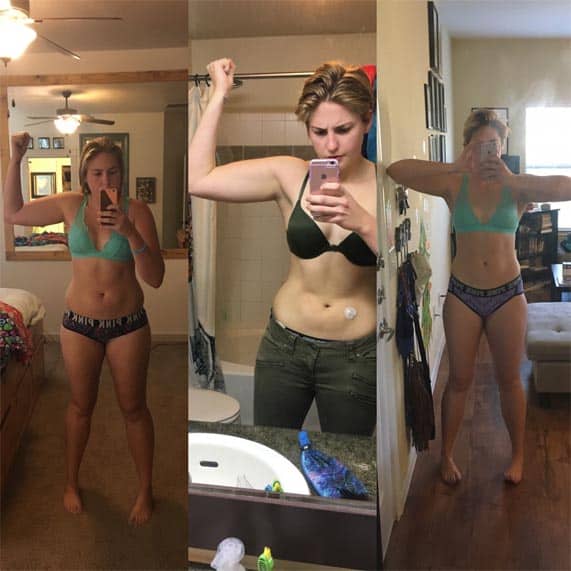
Following our interview with weightlifting lady Emily Westfall, fitness guru and diabetes role model Chris Ruden shared his story and announced some exciting things coming up in 2017.
Not only does Chris hold the title of the world’s strongest disabled power lifter—he also has type 1 diabetes. Chris might also win the medal for being the world’s most wide-ranging multi-tasker: he runs an online fitness- and life-coaching business, writes e-books, designs a clothing line, gives motivational speeches (@ChrisRudenSpeaks) and does interviews…just to name a few of the things on his plate (more on that later).
I had an opportunity to chat with Chris in early January, and just reading about this guy will make you want to get out and hit those New Year’s resolutions out of the park—both diabetes-related and otherwise.
I read a little bit about you and some other interviews you’ve done, so let’s start with your journey with diabetes and how you’ve gotten involved with the diabetes community.
I was born with two fingers on my left hand and a shorter left arm, and doctors really wanted to operate to make me look “normal,” but my parents didn’t opt for that—which is a great thing, in my eyes.
Growing up in a bad area with disabilities and being different caused a lot of issues: from bullying, to body image, to self-confidence issues that I had to deal with. By the time I was 19 and I was diagnosed with type 1 diabetes, I already had that mindset of how to overcome something traumatic, or how to overcome something that you just can’t control. I decided to completely switch my major to exercise science and health promotion and then it just exploded from there.
I started helping diabetics, I started helping kids with disabilities: with cerebral palsy and different amputations, and I started to get involved online. I joined a few online Facebook groups, like Type 1 Diabetic Athletes, and I just started connecting and networking with people. From there, my speaking career started; I started taking up speaking gigs and talking to kids with diabetes. I’ve spoken at Bolus and Barbells, Rodney [Miller]’s amazing group. I just love being able to network with other diabetics.
I advise reading the following articles:
How did you get involved in the diabetes community? Can you talk a little about that?
When I was diagnosed with diabetes, I didn’t know any other diabetics at all, so it was probably a good year or two before I even thought there were options on social media. At that time, I was staying strong for myself and for other people, but it kind of sucked not to have the support [because] you can be in a room full of people and you still feel lonely because you don’t have the support that you’re looking for.
I one day just kind of started looking for fitness groups on Facebook and I was like. “There’s a group for everything! Let me see if there’s any diabetic groups.” And I saw an athlete’s page, and there were thousands of members. So I joined it and I introduced my story on there, and it blew up. People just went nuts. Ever since then, I’ve been really active with the community, posting articles and just trying to help people.
Did you just one day decide you were going to get involved on Facebook?
I’m kind of an impulsive person. I shouldn’t be allowed to ever buy anything, ever.
When I saw the group, I was like, “Oh this is awesome let me post right now.” I just kind of hoped it would work and it worked so much better than I’d ever imagined. I’ve made lifelong friends. I have a handful of people in that group that I could call almost family.
At the time, did you think that fitness, diabetes, and social media added up to something you wanted to make into a career? Or did that develop spontaneously?
That’s actually a really good question. Because of my disability I can’t do anything normally, like what other people do. I can’t grasp things. The gym is the hardest thing in the world for me because you need both hands, you need equal limb length, and machines at gyms are made for “normal people,” I guess you’d say.
I almost told myself there’s no way I could get really serious [about] fitness because I’m limited. Really, the only limitations I had were myself and my thought process on my limitations. When I decided to change my major to exercise science because of diabetes, I just told myself that I was going to use fitness as a tool to help other people overcome adversities, specifically, diabetes and disabilities.
Social media is a huge part of your business: you have a lot of Instagram followers and views on your YouTube channel. Can you talk about how those channels influence your business and your life?

I’m technically the world’s strongest diabetic disabled power lifter. In documenting that, and I’ve been able to grow my social media. I’m almost at 30,000 Instagram followers which is great, and that’s a platform to talk to diabetics and to talk to other people who are struggling.
Social media is 100% the central focus of my business. It’s my number 1 business driver, it’s my ability to reach other people, and my speaking career started earlier [last] year and all my gigs have been from social media exposure. So it’s given me the opportunity to help people that I would never have met. From Beyond Type 1’s online community to Facebook groups to the Peer Diabetes Mentoring Summit, there are so many programs out there that need to be exposed because people just don’t know. It’s really hard to look for something that you don’t know is there.
I built this business online. With online training, I figured, you know that you have to do the work because I’m not there [at the gym with you]. And if you don’t do the work, it’s just not going to happen. I feel like it’s more successful this way, and I talk to my clients everyday.
Do you have a favorite diabetes event that you’ve been to so far?
I think my favorite so far was speaking at an American Diabetes Association camp in Colorado with over 300 kids.
I got to play games with the kids. I felt like a kid again. I never got the opportunity to go to diabetes camps because I [was diagnosed] late in life. But seeing that, and seeing the response - a kid messaged me on Instagram:“Hey, before your talk I really didn’t like being diabetic and I wasn’t controlling my sugars, but after I saw you, you inspired me to control my blood sugars and now I love it.” That just gives me the shivers right now. That’s what made it so addicting. In a room of 300 people, if I can at least help one person change their perception, that makes it for me.
Everyone has the ability to change how they react to situations. We might not be able to change what happens, but we can always, always, always change our reaction to the situation. That’s my main goal. I love helping people lose weight and get in shape, but really it’s about being more confident, it’s about changing the way they see the bad things and appreciate the good things.
Do you ever feel a lot of outside pressure to be “good” at diabetes or perfect at weightlifting, given the attention that you get?
I’m not perfect, no one’s perfect, and if you say you’re perfect, you’re a liar. No matter how good you get at controlling your diabetes, it’s such a dynamic thing. Yesterday’s perfect day could be today’s terrible day. I don’t feel pressure to control my diabetes, I feel this desire to control my diabetes as a way to influence other people watching me, you know? In terms of fitness, I love lifting and I love competing and it’s my own drive. My best pressure is my own. It’s my desire to compete with myself.
You recently wrote a book, right? How did you come to do that along with all the other things you do, like a clothing line?

Taylor is a client of Chris's who lost 21 lbs. in 3 months.
I always overfill my plate. I wish I could say it’s like a silver plate, but it’s more like a paper plate that kind of folds the more I put stuff on it. But I came about to writing my e-book about losing body fat because so many people had questions, and generally there’s no universal fix to an individual problem but there is a universal concept that can help most people, so I wanted to put that in a format that everyone could afford. Sometimes money is an issue and it’s a barrier to stop them doing things like training with me, which sucks. I have another e-book that I just wrote that I’m actually releasing for free on my website in the next month, just because I want people to have it.
On top of that, this is the first mention of it - and I can’t release all the details - but I am working with a friend on an actual hardback book we’re releasing in November regarding diabetes. That’s all I’m going to say, but it is going be so epic! It is like my biggest focus right now, and I’m just so excited for it. Stay tuned!
Where can we find you when you’re not working?
I’m constantly working, So, I write for my website…I guess that’s still “working.” If I’m not, honestly, doing any sort of work related to my businesses, then I’m fishing or shooting. I guess those are my two fun hobbies in life. My girlfriend is a very avid fisherman as well, somehow I taught her how to fish and now she’s catching bigger fish than I do. She’s like getting super popular on some of these social media fishing groups. I’m like, what the heck?! But it’s fun. It’s definitely a fun pastime.
Do you find it hard to separate your personal and your professional social media and how people are constantly able to reach you?
My favorite part of my life is my business, so I guess that’s my personal life. I think the hard part might be my girlfriend wanting to punch me when I’m on my phone a lot, but I love when people message me…I have people come up, you know, in normal life, and be like, “Hey! You’re that guy from Instagram!” I kind of love it. I absolutely love helping people.
I saw one of [the] people that I look up to in a gym once, and I went up to him just to say hi, and he kind of gave me a cold shoulder. And I was just blown away by how someone could have such a level of inspiration, such a platform, without wanting to share that all the time. I just feel like if you’re in that position you have to genuinely want to help people.
Like the kid that sent you a message.
These kids I talk to from some of these camps, it’s crazy. You know, they’re messaging me with updates on how good they’re doing and in my head when I first thought of the event I just thought that I would speak and people would like it and that’s it. But I really see the ability to transform someone through thought, which is nuts, you know.
I can’t get rid of diabetes. My clients can’t get rid of diabetes. But what I can do for them is I can give them an opportunity to get around it and adapt so that they can still succeed and not let diabetes stop them.
For more, check out Chris on Instagram (@chrisruden) and on Facebook.
This interview has been edited for length and clarity.
TheDiabetesCouncil Article | Reviewed by Dr. Sergii Vasyliuk MD on May 21, 2020

